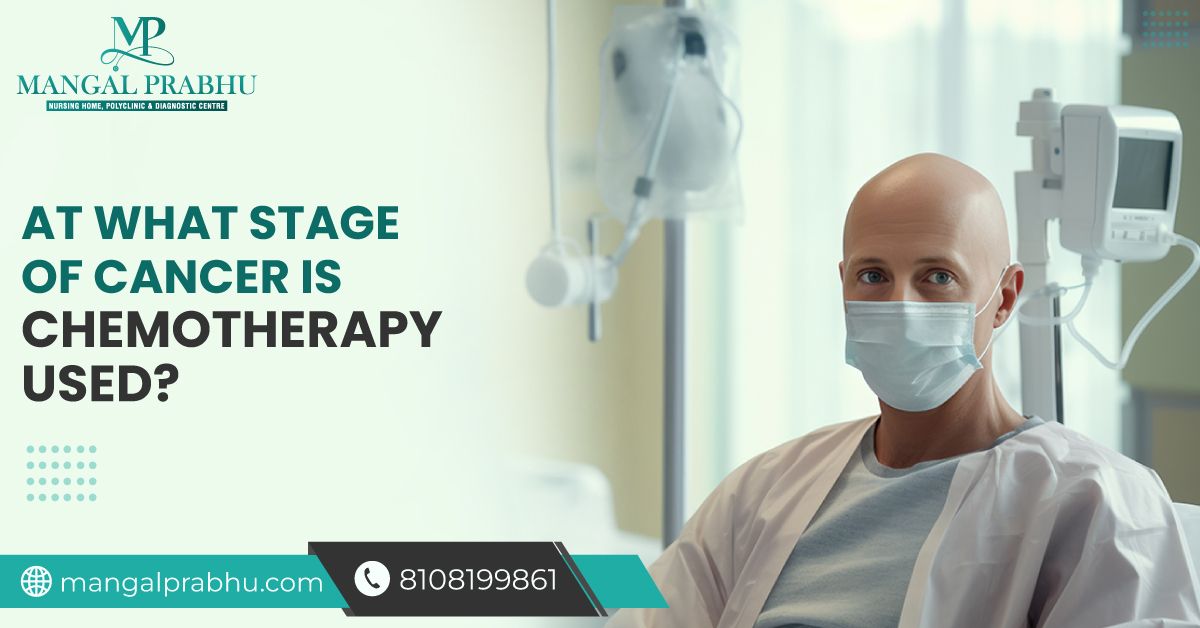
At What Stage of Cancer Is Chemotherapy Used?
Chemotherapy is a combination of medications used to kill cancer cells that are growing aggressively and spreading to your different organs. Chemotherapy treatment in Navi Mumbai is recommended for patients diagnosed with different stages of cancer.
It’s considered an effective treatment option for all types of cancers. The type of chemotherapy your doctor advises depends on the stage, type, and severity of the cancer. They might also factor in your age and health goals to determine the most suitable treatment option.
The Different Stages of Cancer
Chemotherapy can be given for stage I to stage IV cancer patients. Most types of cancer are categorized into four stages, and the diagnosis is done based on how aggressive the cancer cells are, where they have spread, and the patient’s health. For most types, cancer in its first stage is restricted to a specific organ, while the same in stage IV is considered metastatic cancer that has spread to the surrounding organs, probably throughout the body.
Here’s how chemotherapy is planned for different stages of cancer.
Stage 1:
Chemotherapy combined with surgery
Stage 2:
A surgical removal of the malignant tumor and several sessions of chemotherapy.
Stage 3A:
Chemotherapy with surgery or surgery followed by chemotherapy, radiation therapy, and immunotherapy, depending on the location of the cancer. If the cancer can’t be removed surgically, then a combination of chemotherapy, immunotherapy, and radiation therapy is prescribed.
Stage 3B and 3C:
Chemotherapy with multiple rounds of radiation therapy followed by surgery and immunotherapy.
Stage 4:
Chemotherapy, targeted therapy, surgery (if possible), followed by more rounds of chemotherapy.
Types of Chemotherapy Drugs
Chemotherapy drugs are a combination of medications consisting of the following:
i) Alkylating Agents:
These are responsible for destroying the DNA of the replicating cancer cells.
ii) Antimetabolites:
These drugs can destroy cancer cells when they are about to grow out of control in your body. Antimetabolites work for breast, ovarian, and other types of cancer.
iii) Antitumor:
The medication changes the DNA structure of cancer cells, restricting their growth and multiplication inside the body. Mitotic inhibitors are also commonly used to treat cancer cells, but they contain a compound that might destroy healthy cells, as well. So, their use is often limited to certain types of cancers.
Benefits of Chemotherapy
Chemotherapy is the most viable cancer treatment for people diagnosed with cancer in different stages and severity statuses. Here’s how it benefits:
- Restrict the growth of the tumor or shrink its size to make surgical removal of the cancer possible
- Prevent the cancer cells from dividing
- Reduces the risk of relapse
Potential Side Effects
Oncologists in Navi Mumbai recommend chemotherapy after considering your age, size, type of cancer, and your health. Before you choose this treatment, know that it comes with side effects. These may vary depending on the chemo drugs used, but some common side effects found in most patients include:
- Fatigue
- Nausea and vomiting
- Diarrhea
- Hair loss
- Mouth sores
- Loss of appetite
- Anemia
- Weakness in muscles
Schedule an appointment with your healthcare to discuss the most suitable chemotherapy option, the length of the treatment, and the risks.
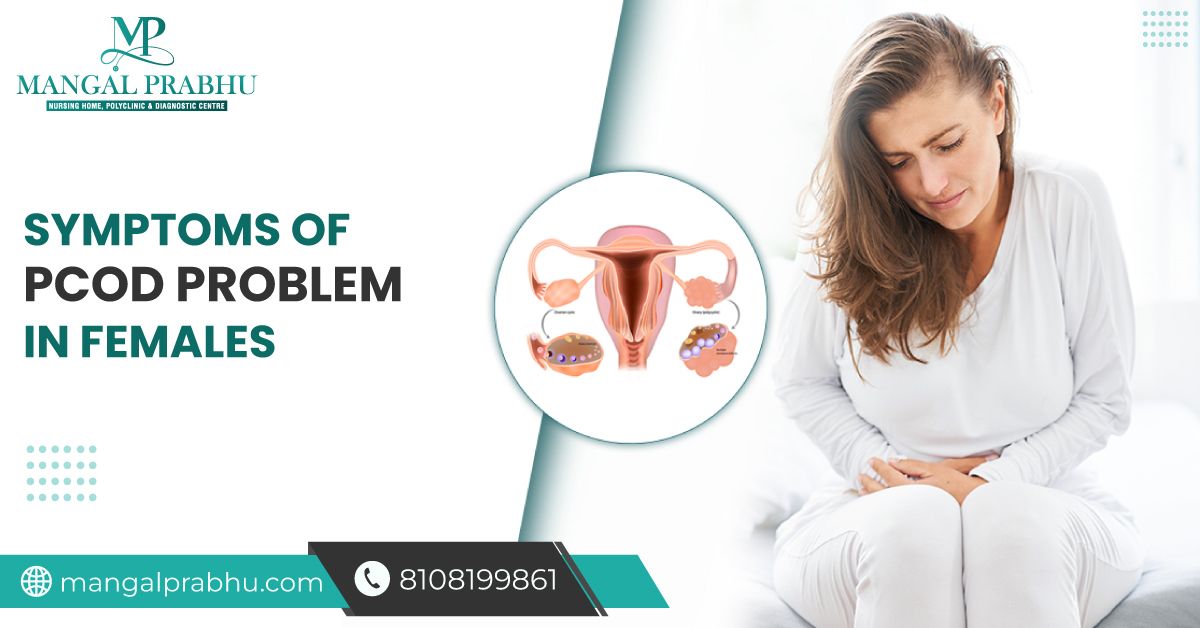
Symptoms of PCOD Problem in Females
Polycystic Ovarian Syndrome, or PCOD, occurs in women during their reproductive age. It disturbs the production of the woman’s reproductive hormones, estrogen and progesterone. Fortunately, PCOD treatment in Navi Mumbai is available for those experiencing the painful symptoms.
PCOD causes irregular periods, as the mature eggs that are supposed to be released from your ovaries once a month might not mature or get released. PCOD also occurs when there’s excess production of male hormone androgen in the woman’s reproductive system.
Symptoms of PCOD problem in females
You might notice the symptoms of PCOD when your menstruation starts, but symptoms can also show up later, i.e., in your 20s and 30s. Here are some common symptoms of Polycystic Ovarian Syndrome.
1) Irregular Periods:
The most common symptom of PCOD is irregular periods. The regular menstruation cycle is 28 days. However, if you have PCOD, you might notice your period getting delayed by ten or more days. Some women experience periods that last longer than nine days and occur frequently.
2) Infertility:
Difficulty conceiving is another symptom of PCOD. Since your periods and ovulation cycle are irregular, you might have difficulty getting pregnant.
3) Excess Androgen:
Women’s reproductive organs produce a small amount of androgen. However, those with PCOD report excess androgen production, which can lead to excessive hair fall, excess hair on the face and body, and acne.
In addition to these, PCOD can result in rapid weight gain.
Also Read: PCOD vs PCOS: Difference Between PCOD and PCOS
Causes of PCOD
The exact cause of PCOD is unknown, but the following conditions can increase your risk of developing this hormonal disorder.
i) Insulin Resistance:
If your body produces too much insulin, the level of androgen might also rise significantly, and this will affect the ability of your ovaries to release mature eggs.
ii) Heredity:
People with a family history of PCOD might develop this condition in their reproductive years. Certain genes are linked to PCOD.
Risks and Complications of Untreated PCOD
PCOD can affect your fertility. It increases the risk of inability to conceive, miscarriage, and premature birth. In pregnant women, untreated PCOD can lead to gestational diabetes and hypertension. Moreover, it can cause mental health issues, such as depression and anxiety, which are often linked to excessive weight and hair loss.
Diagnosis of PCOD
A gynecologist in Navi Mumbai will ask you about the symptoms and menstrual cycle and take a physical exam to diagnose PCOD. An ultrasound can help confirm the presence of ovarian cysts. They also recommend a blood test to check your insulin level and the overall hormonal balance.
Treatment Options for PCOD
There’s no permanent cure for PCOD, although symptoms can be managed with a balanced diet and a healthy lifestyle. Your gynecologist will prescribe medication for excessive hair growth on your body, hair loss, acne, sleep apnea, and irregular menstrual cycle. For fertility issues, a surgical procedure that removes ovarian cysts and destroys male-hormone-producing tissues can help.
Conclusion
Getting pregnant with PCOD is possible, but the condition requires treatment. Managing the symptoms, such as excessive weight and irregular periods, can help improve your quality of life and your reproductive health.
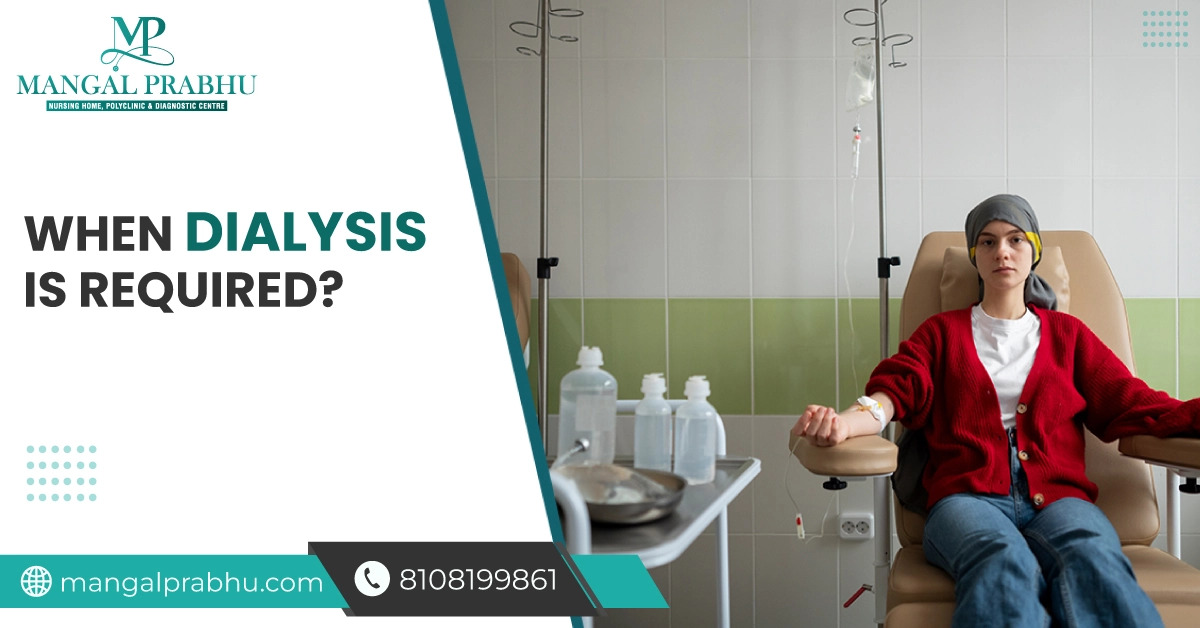
When is Dialysis Required?
Your kidneys are responsible for removing waste from your bloodstream and the extra fluid through urine. This bean-shaped organ also maintains the level of potassium, calcium, and other vital minerals in your body. Kidney failure can lead to the accumulation of waste and extra fluid in your bloodstream. It’s important to consult a Nephrologist in Navi Mumbai to get a dialysis—a procedure that performs the function of your kidneys. Let’s see when it’s needed.
Symptoms of Kidney Failure
Here’s what happens if one or both of your kidneys stop working.
- Nausea and vomiting
- Feeling the urge to urinate frequently
- A metallic taste in the mouth
- Lost appetite
- Edema
- Muscle cramps
- Fatigue
- Dry skin
The symptoms are worse in people with high levels of waste substances in their blood.
When is Dialysis Required?
If your kidney is unable to clear toxins from your blood or remove excess fluid from your body through urine, you might need dialysis. The procedure is mainly recommended when only 10-15 percent of your kidney function is left.
If your kidneys stop working, you will notice swelling around the ankles, nausea, vomiting, and extreme fatigue. However, it’s possible that the toxic substances build up gradually in your bloodstream without causing these symptoms. So, it’s best to talk to your doctor to know if you need dialysis treatment in Navi Mumbai.
Types of Dialysis
Dialysis is categorized into two types:
i) Hemodialysis:
This procedure involves removing toxins from your bloodstream through an artificial kidney. The blood from your body passes through this machine to eliminate waste, and the purified blood is returned to your body. The procedure takes 4-5 hours and is performed in an outpatient setting in a dialysis center.
ii) Peritoneal Dialysis:
In peritoneal dialysis, a catheter is inserted into your abdomen and used to pass the dialysis solution (which consists of a special formula that removes toxic elements from your blood) into the peritoneum. This solution removes excess fluid and waste from the blood within your body. The waste must be drained after the procedure.
Peritoneal dialysis is a more convenient option for patients who can’t schedule regular trips to the hospital, but it comes with a few complications, like infection and hernia.
Life After Dialysis
Life after dialysis isn’t different from normal life. Your healthcare provider will give you instructions on how to keep your dialysis solution and bags clean. You can travel, work, and perform all routine tasks as usual. However, if you are traveling, you may need to arrange the dialysis sessions at the local dialysis center in your destination address. Those undergoing peritoneal dialysis can carry portable dialysis machines, solutions, and drainage bags with them.
Conclusion
A person can survive with one kidney, but if both of them stop working, dialysis or a kidney transplant is necessary. Kidney failure can occur suddenly or gradually. People with diabetes, hypertension, and other kidney diseases are at an increased risk of kidney failure. If you are diagnosed with kidney failure, dialysis can help you live a healthier and normal life.
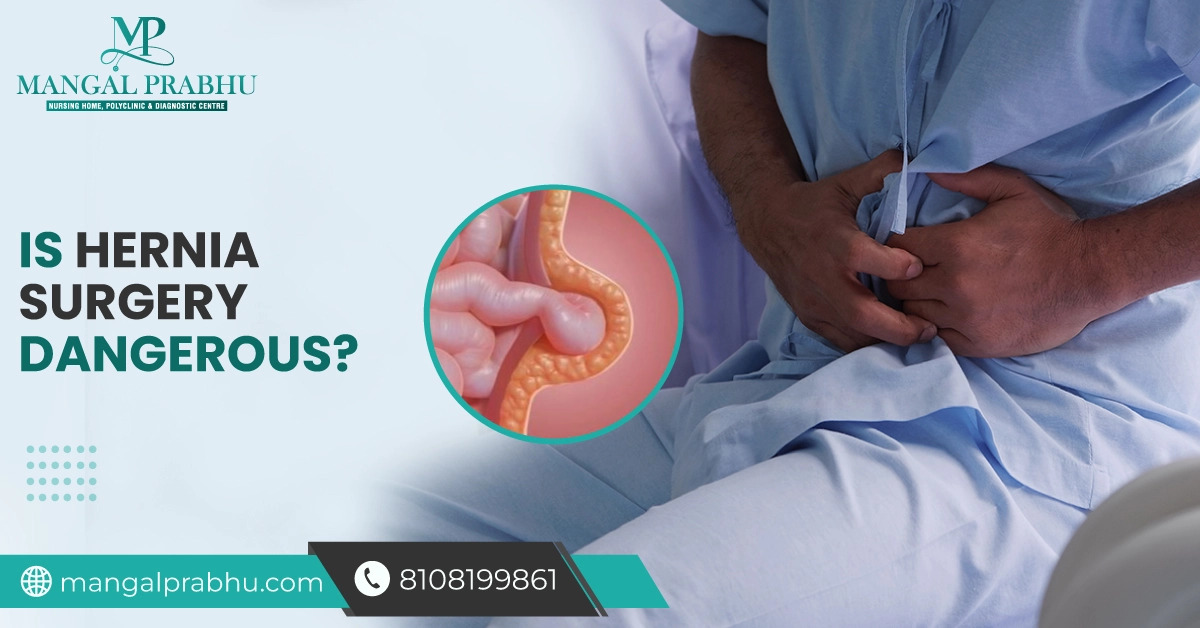
Is Hernia Surgery Dangerous?
What is Hernia Surgery?
Hernias is a condition where an organ or tissue pushes via a weakness in the muscle or connective tissue. Even though hernias can be helped with a change in lifestyle, the surgical remedy is occasionally important, mainly when it causes excessive aches and starts to intervene with everyday existence.
Types of Hernias and Their Risks
There is a huge style of hernia that includes femoral, inguinal, umbilical and hiatal hernias. Every individual of hernia has an excellent amount of danger. For instance, inguinal hernia are discovered greater in guys and might cause bowel obstruction if left untreated. On the other hand hiatal hernias can cause acid reflux and other issues in digestion. Nevertheless, the danger of hernia surgery depends on several factors: the form of hernia, the affected person’s fitness, and the surgical approach that is utilized in surgery. Mangal Prabhu Hospital provides treatment for hernia.
Safety Measures and Advances in Hernia Surgery
The improvement in scientific technology has stepped forward the protection of hernia surgery in the past few years, which has hindered the threat to an exquisite volume. Small and brief strategies consisting of laparoscopic and robot-assisted surgical operation have appreciably reduced the threat of headaches and feature also shortened the recovery time in contrast to conventional open surgical operation. Hernia Treatment in Navi Mumbai deals with sufferers with hernia and presents them with an efficient remedy. Moreover, Surgeons now have a higher right of entry to imaging generation and surgical instruments, permitting them to provide particular and powerful remedies for hernias.
Also Read: Symptoms Of Hernia In Male
Success Rates and Recovery Post-Surgery
In preferred, hernias surgical operation has an extra fee of success than failure; it facilitates in relieving the ache of patients and their symptoms and also reduces the chance of hernias recurrence. The restoration time after the surgical procedure varies depending on the sort of surgery executed and the character affected person. Still, usually, patients return every day for a few weeks after the surgical procedure. Patients must comply with the publish-surgery instructions like averting lifting heavy stuff and increasing bodily hobbies; following those can help and ensure great healing.
Common Concerns and Misconceptions about Hernia Surgery
Despite the good effectiveness of hernia surgery, there are nonetheless common things that should be handled and misconceptions approximately hernia surgical treatment. A large variety of people fear the hazard of infections, bleeding, or nerve damage, while others consider the possibility of recurrence of the hernia. These dangers are a gift with each surgical procedure. Still, they are distinctly low, especially while carried out by means of a professional healthcare professional, including a Hernia Surgeon in Navi Mumbai with a specialized clinical facility.
Conclusion
The conclusion is that common hernia surgical treatment is safe and effective to a notable degree for treating hernias and relieving pain and its various signs. The development in medical generation and surgical techniques is a major key that enables a lot in decreasing the danger involved in traditional open surgical treatment. By knowing the impact and protection measures and development in surgical procedures, patients need to make decisions about their treatment options; in case you are looking for a treatment option, then you definitely need to visit Mangal Prabhu Hospital as they provide a notable remedy.

How to Sleep After Gallbladder Surgery?
Introduction
Gallbladder surgery can deliver relief from aches and soreness, whether it’s miles removal or other techniques. It is a necessary step towards stepped-forward fitness and health. However, the street to recovery has its problems with sleep; therefore, we’ll display you a few strategies that may assist in restful sleep after gallbladder surgical treatment. Visit Mangal Prabhu Hospital If you continue to face problems.
Understanding Gallbladder Surgery
A Gallbladder surgical operation is finished to find out issues like gallstones or other infections like inflammation that affect the organ. Though the surgical procedure aims to improve fitness and decrease signs, there nevertheless can be post-surgical treatment effects that can deliver aches, discomfort and modifications in digestion, all of which can disrupt sleep.
Post-Surgery Recovery and Sleep
The night after surgical operation can be a hard one for sleep as pain and soreness from the surgical areas and the aspect outcomes of medicinal drugs can make it hard to locate a snug sleeping position. Furthermore, it modifies the digestion and dietary regulations that could cause discomfort all through the night. Gallbladder Disease Treatment in Navi Mumbai offers an amazing remedy that can help in lowering the aftereffects of gallbladder surgical procedures.
Also Read: Signs Of Complications After Gallbladder Surgery
Tips for Better Sleep After Gallbladder Surgery
1. Establishing a Comfortable Sleep Environment
A sleep friendly environment is essential to sleep peacefully. Make sure your bedroom is cool, quiet and dark with a comfy pillow and bed. Think about the use of more pillows to lessen stress on the surgical website and help your frame.
2. Following Restful Sleep Hygiene Practices
Make limitations on the intake of caffeine and alcohol intake and decrease display screen time earlier than sleep. Good sleep hygiene is essential for restful sleep at some point in the recovery duration. Establish a regular agenda for the regular mattress and wake times throughout the recovery.
3. Incorporating Relaxation Techniques Before Bed
Relaxation strategies like deep respiration, mild stretching, or meditation can assist in calming the mind and frame earlier than bedtime. Gallbladder Surgeon in Navi Mumbai enables patients in each aspect. They ensure that the patient is having as few issues after surgery as possible. Take attention to setting up a recurring bedtime that includes these practices in an effort to help your body to help in sleep by way of signaling the frame that it’s time to unwind.
Conclusion
Recovering from gallbladder surgery is indeed a time-consuming procedure; endurance,self-care, and, now and again, extra attention to sleep aren’t clean for the patient who simply went through the surgery. Establishing precise sleep hygiene practices, snug sleep surroundings, and the usage of rest techniques earlier than the mattress can enhance the body’s recovery process and improve the overall sleep amount. It is essential to be gentle with yourself at some point this time and reach out to professional healthcare companies like Mangal Prabhu Hospital that assist in offering the best hospitality to the patient. Having proper care and hints to improve overall napping can make your post-surgical operation sleeping troubles.
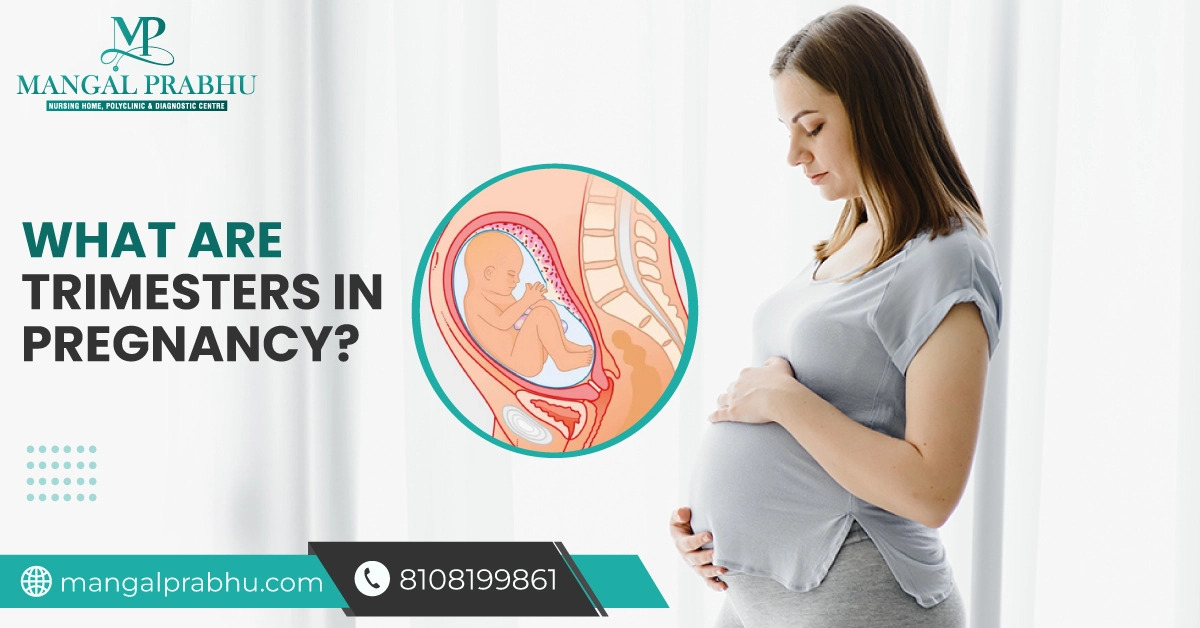
What are Trimesters in Pregnancy?
What are Trimesters in Pregnancy?
Trimester is a journey of pregnancy. The concept of trimesters acts as a way to guide through the changes and growth in pregnancy. It is the ninth month of the journey, which is divided into three phases, each lasting for three months. If you are looking for a place to help you through trimesters, then you should visit Mangal Prabhu Hospital.
What Happens During Each Trimester?
i) The First Trimester
The first trimester starts from idea to week 12. In that time, an inspiring transformation takes place wherein a fertilized egg implants itself into the uterine lining, constantly dividing and forming the embryo. In this era, the primary organs and structures start to develop in infants.
ii) The Second Trimester
This continues after the first trimester, which is from the 13th week to 27 weeks. The second trimester brings a sense of remedy to maximum moms as early signs and symptoms of being pregnant, like vomiting, lessen. There is a massive change that is visible, such as the visibility of the baby’s bump. Energy levels in women typically increase, and they often experience a newfound sense of vitality.
iii) The Third Trimester
The third trimester is the last. It lasts from week 28 until birth; during the third trimester, the mother goes through remarkable changes. The baby gains weight in this period, due to which the mother may face little discomfort in her organs and joints due to the pressure of the baby.
Also Read: When to Consult a Doctor During Pregnancy?
Common Symptoms and Changes During Each Trimester
Every trimester has its significant changes and symptoms. For example, fatigue, morning sickness, and breast tenderness are common in the first trimester, whereas heartburn, back pain and swelling may arise later on.
Tips for Maintaining a Healthy Pregnancy During Each Trimester
Regularly taking a look at healthcare carriers and heading off harmful substances like tobacco, alcohol, and junk meals are important and also vital for a wholesome pregnancy. It is essential to have healthy and balanced nutritious food, work often, stay hydrated and get the proper treatment for the baby to be wholesome. Pregnancy Care Hospital in Navi Mumbai Provides a healthy diet and a suitable amount of food that a mother should take; they also provide healthcare for mothers. Pregnancy Care Hospital in Navi Mumbai Provides a healthy diet and a suitable amount of food that a mother should take; they also provide healthcare for mothers.
Preparing For labor and Delivery in Each Trimester
As the date of delivery comes closer, it is important to be prepared for the delivery and labor. This involves creating a birth plan, attending childbirth classes and grasping pain management techniques. You should visit an Obstetrician in Navi Mumbai as they provide labor and proper planning for the delivery of the baby.
Conclusion
Trimesters in pregnancy show a pathway for excited mothers to understand and go correctly through this transformative journey of bringing new life into the world. Mangal Prabhu Hospital Treats and gives a healthy pregnancy plan to the mothers. Each phase of the trimester brings joy and challenges for the mother. By having healthy pregnancy plans and self-care, women can go on this journey with confidence.

What Causes Jaundice in Newborns?
1. Introduction
Having a newborn is a first-rate experience for nearly each determined. Pediatrician in Navi Mumbai provides necessary treatment to newborn babies who are affected by jaundice. Perhaps it isn’t rare for brand-spanking new parents to face unpredictable challenges, among which is jaundice. Jaundice is an illness that may cause pores of the skin to color yellow and white in the eyes, and that may be worrying to parents.
2. What is Jaundice in Newborns?
Bilirubin is a yellowish pigment produced whilst the red blood cells wreck down since the newborn’s liver isn’t always completely advanced in order that it may exercise bilirubin.
3. Causes of Jaundice in Newborns
There are too many reasons that could help with the incidence of jaundice in a new child. The most commonly discovered among them is physiological jaundice, which occurs due to the novelty of the liver in processing bilirubin. Nevertheless, there are a few different factors as well, like blood incompatibility between the mother and the infant, a few infections or a few biological errors which can cause jaundice.
4. Symptoms of Jaundice in Newborns
The maximum commonplace and the most seen symptom of jaundice is the yellowing of skin shade and the whiteness of eyes -. Lethargy, dark-coloured urine and terrible feeding are also signs of jaundice in newborns. Doctors for Jaundice Treatment in Navi Mumbai are looking over the symptoms and offer the quality remedy to the new child.
Also Read: The Importance of Regular Pediatric Checkups
5. Diagnosis of Jaundice in Newborns
In most cases, jaundice in newborns resolves on its own without treatment. However, in cases of severe jaundice or underlying medical conditions, treatment may be necessary. Treatment includes blood tests to check the bilirubin level. If the test reports are severe, then further exams are conducted to determine the important cause of the illness.
6. Treatment for Jaundice in Newborns
You definitely should visit or book an appointment at Mangal Prabhu Hospital if you are looking for treatment for your newborn. The treatment typically consists of phototherapy, which essentially exposes the newborn skin to several important lighting fixtures to decrease the bilirubin levels.
7. Prevention of Jaundice in Newborns
It is mentioned that jaundice can’t be avoided every time. However, there are several steps that Dad and Mom have to take to lessen the possibility of jaundice. They have to ensure sufficient feeding and hydration for the child. This can assist in the promotion of feces and urine; feces and urine result in the removal of the excess amount of bilirubin. Furthermore, the right parental care and looking for chance elements like incompatibility of blood kind can assist in song jaundice in the early degrees.
8. Conclusion
Jaundice in mother and father may be a matter of situation for dad and mom, but with enough statistics and cognizance, it is able to be substantially reduced to a volume. Understanding its reasons, prevention techniques and symptoms, dads and moms can take steps to ensure the health of their newborn. If parents still face troubles, they could visit Mangal Prabhu Hospital. They offer wonderful treatment to patients with jaundice, specifically newborns with jaundice.

Celebrate Motherhood with Our Special Maternity Care and Delivery Package Offer!
Are you excited? It’s a feeling of excitement as you get ready the welcome of a new family member to your family. We at Mangal Prabhu Hospital, we recognize the significance of this moment and try for to create a journey that is memorable and enjoyable as we can.
We are pleased to announce the exclusive Stree Sehat Abhiyan service which is a unique maternity care and delivery package that is designed to provide you with peace of mind through this crucial period in your journey. Our aim is to provide excellent care, without the expense of excessive hospital expenses.
When you make your delivery registered with us now you will gain access to a wealth of advantages:
- The ANC Checkup and ANC Profile: A regular antenatal checkup is vital to ensure an uninvolved pregnancy. Benefit from our free ANC checkup and profile to check your health as well as that of your baby.
- Prices at Specially Discounted on Deliveries Packages: Our belief is that the best medical care for pregnant women should be available to everyone. Get special offers on all of our delivery services, specifically designed to meet your individual requirements.
- Free Consultation with a Gynecologist: Our expert gynecologists in navi mumbai are available to answer any questions that you may have. You can avail a consultation for free in which you can discuss pregnancy concerns, birth preferences and postnatal treatment.
- CBC & TT Injection: Your health and security are our top priority. Get the vital CBC tests as well as TT injections as part of our complete maternity health package.
Deliveries starting at just the price of Rs. 28,125, there’s not the right time to get started on this amazing trip with us. However, hurry up – this offer is only valid from the 1st march to 31st march 2024.
Don’t let financial concerns overshadow the joy of expecting a baby. Rely on Mangal Prabhu Hospital to provide the support and care you need, at every step of the process. Make an appointment today to feel the benefits!
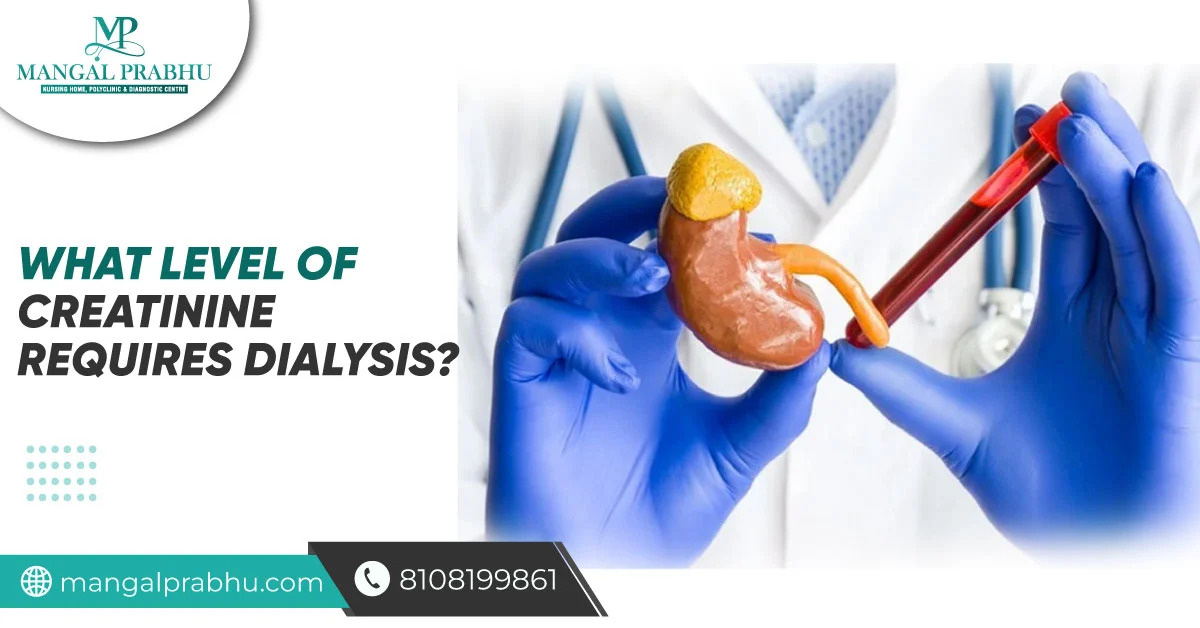
What Level Of Creatinine Requires Dialysis?
I. Introduction
Kidneys act as tireless filtration plants, eliminating these wastes, one of which is creatinine, a residue from muscle activity. However, if this filtration plant malfunctions, you end up exhausted and overwhelmed by toxins. That’s where the need for dialysis arises, a complex decision shrouded in medical jargon and uncertainty. Dialysis acts as a trusty pit crew, clearing the waste and helping an individual get back on track. Thus, it would be best for an individual to seek the best Dialysis Center in Navi Mumbai like Mangal Prabhu Hospital. However, understanding this critical crossroads and navigating the maze of creatinine help in making informed decisions.
II. Normal Range of Creatinine Levels
Understanding the creatinine level helps in making quick decisions without any hassle. However, normal creatinine levels may range from 0.7-1.3 mg/dL for women, and 0.9-1.4 mg/dL for men are guidelines, not absolutes. Think of a bodybuilder compared to a petite woman – comparing just their creatinine wouldn’t tell the whole story. Just like every individual is unique, their normal creatinine level can vary slightly depending on several factors:
- Age: Muscle mass naturally decreases with age, potentially lowering creatinine levels.
- Sex: Men tend to have more muscle mass, leading to slightly higher creatinine levels than women.
- Race: Ethnicity can influence muscle mass and slightly alter creatinine levels.
- Dehydration: Not drinking enough water and body dehydration leads to a considerable rise in creatinine levels.
- Medication: Some medications may also influence the level of creatinine.
Also Read: What is the Dialysis Process?
III. When is Dialysis Necessary?
Identifying creatinine levels helps in making the right decision for dialysis. According to the best Nephrologist in Navi Mumbai when the estimated glomerular filtration rate (eGFR) is less than 15mL/min/1.73m² an individual may require dialysis. Symptoms whisper important clues, thus when an individual experiences fatigue, nausea, and unexplained weight loss, indicates significant impairment and demands investigation. Considering crucial elements like individuals’ overall health, age, and preferences regarding treatment type and lifestyle helps in making decisions for dialysis.
IV. Other Factors to Consider
The creatinine stage acts as the starting point, but other critical factors play their roles:
- Complications like uncontrolled diabetes or heart disease can act as unexpected plot twists, potentially necessitating earlier intervention, much like unforeseen obstacles on a journey.
- Rate of decline: This refers to the speed of kidney function deterioration. Imagine a rapid leak compared to a slow drip; both require repairs but at different urgency levels.
- Patient’s voice: This is the heart of the equation. The patient’s values, desired quality of life, and active participation in decision-making are paramount. Remember, it’s their journey, and their voice matters most.
V. Conclusion
Dialysis is a powerful tool, but it’s not a magic fix. It’s a collaborative effort, like a team strategizing the best route to the finish line. A nephrologist at Mangal Prabhu Hospital is your expert guide, interpreting signs, navigating complexities, and working alongside you to craft a personalized plan. Remember, informed decisions based on a holistic approach, not just a single number, unlock the best possible outcome for your kidney health and overall journey.
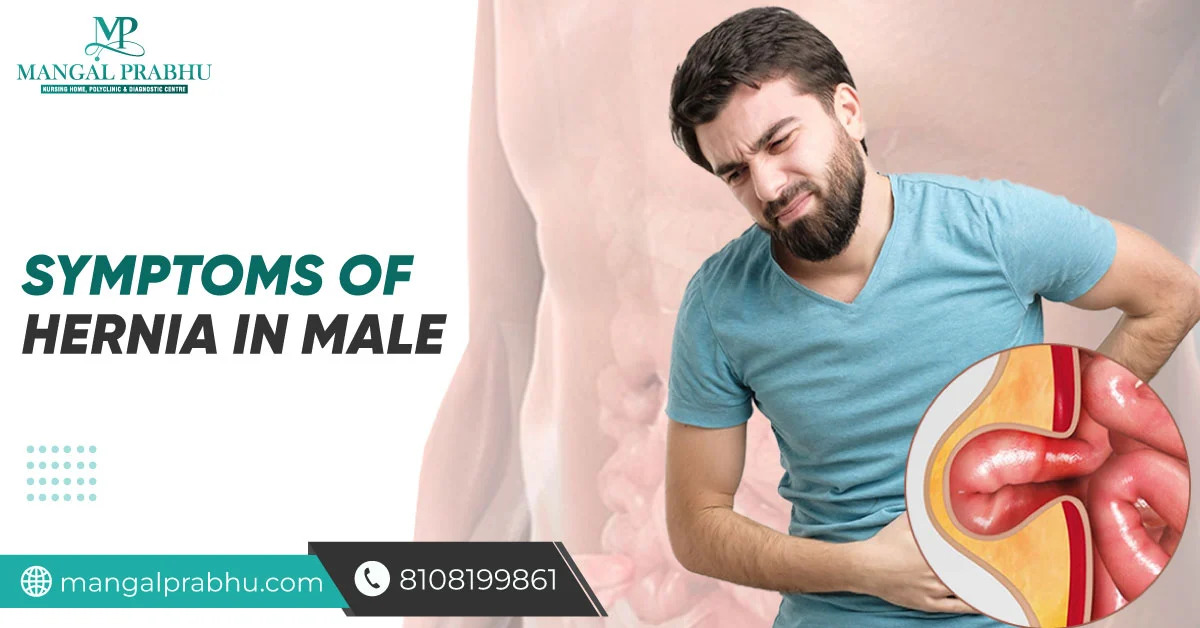
Symptoms Of Hernia In Male
I. Introduction
This condition can develop in various parts of the body, but it commonly occurs in the abdomen or groin area. According to Mangal Prabhu Hospital, recognizing the symptoms of hernia in males is crucial for several reasons. Firstly, timely identification allows for prompt medical intervention, which can prevent complications and alleviate discomfort.
Hernia occurs when an organ or fatty tissue protrudes through a weak spot or tear in the surrounding muscle or connective tissue. Additionally, untreated hernias can lead to more serious complications, making early detection essential for optimal outcomes. Here, you can delve into the various symptoms of hernia in males.
II. Common Symptoms of Hernia in Males
i) Bulge or swelling in the groin or scrotum:
One of the most prominent signs of a hernia in males is a visible bulge or swelling in the groin or scrotum area. This bulge may become more noticeable when standing, coughing, or straining.
ii) Pain or discomfort in the affected area:
Hernias can cause varying degrees of pain or discomfort, ranging from mild to severe. This discomfort may worsen with physical activity or prolonged periods of standing.
iii) Heaviness or pressure sensation:
Some individuals with hernias may experience a sensation of heaviness or pressure in the affected area, particularly during physical exertion or lifting heavy objects.
iv) Difficulty or pain during physical activities:
Engaging in physical activities such as lifting, bending, or exercising may exacerbate hernia symptoms, leading to increased discomfort or pain.
III. Less Common Symptoms of Hernia in Males
While the aforementioned symptoms are more prevalent, hernias can also manifest through less common signs, including:
a) Nausea or vomiting:
In some cases, hernias may cause nausea or vomiting, especially if the protruding organ or tissue becomes obstructed.
b) Changes in bowel movements:
Hernias affecting the abdominal region can sometimes lead to changes in bowel movements, such as constipation or difficulty passing stool.
c) Urinary difficulties:
Inguinal hernias, which occur in the groin area, may cause urinary difficulties such as frequent urination or difficulty emptying the bladder.
IV. When to Seek Medical Attention
If you experience any of the symptoms mentioned above, it’s crucial to consult a healthcare professional like Hernia Surgeon in Navi Mumbai promptly. Delaying medical evaluation and treatment can increase the risk of complications associated with hernias, such as strangulation or obstruction of the protruding tissue.
V. Treatment Options
- Surgical interventions: Repairing weakened muscles or tissues through surgical procedures.
- Non-surgical approaches: Utilizing methods like wearing supportive garments or trusses.
- Lifestyle modifications for prevention: Implementing habits such as proper lifting techniques and maintaining a healthy weight to reduce the risk of hernia development.
VI. Conclusion
Recognizing the symptoms of hernia in males is essential for early diagnosis and prompt intervention. By being aware of the common signs and seeking timely medical attention, individuals can effectively manage hernias and minimize the risk of complications.
If you’re experiencing any symptoms suggestive of a hernia, don’t hesitate to contact Mangal Prabhu Hospital for expert evaluation and hernia treatment in Navi Mumbai. Your health and well-being are our top priorities.
